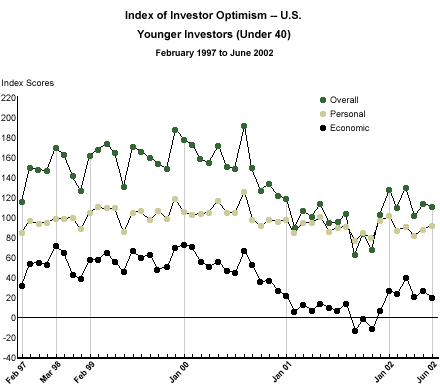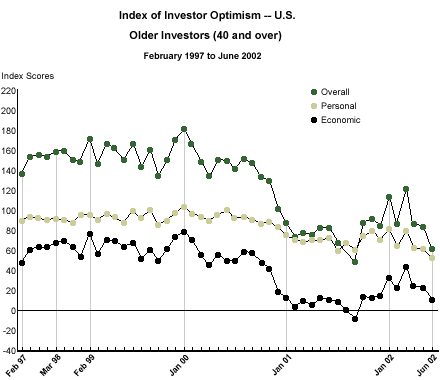Despite the crisis of confidence in the nation's business executives that has dominated Wall Street lately, one group remains surprisingly optimistic: younger investors. While new Gallup/UBS Index of Investor Optimism poll data show overall investor optimism at 72 in June, optimism among younger investors is at 110. And, while overall investor optimism has fallen 49 points since March, optimism among younger investors has declined by only 19 points. (By our definition, you don't have to be in Generation X to be a younger investor. Because most people start investing after they have completed school and have been working for some time, we made the split at under age 40 versus 40 and older.)
Why are younger investors so much more optimistic than their older counterparts?
One reason may be that they are less risk-averse than other investors. Because they have so many good earning years ahead of them, they may be more comfortable adopting a long-term view. They may encounter adversity in the near term, but they know if they continue to invest routinely, their asset portfolios will grow significantly over time.
Another possibility is that younger investors have probably accumulated at least a modest amount of assets and are likely to be substantially better off than non-investors in their age group. Thus, these younger investors would have good reason to be relatively optimistic about the future.
Still, I believe the real reason why younger investors are so optimistic is their lack of experience. Many younger investors formed their investment expectations based upon their experiences in the last half of the1990s -- an extraordinary period for investors characterized by incredible rates of return over a number of years. More importantly, there was no period of real or prolonged adversity for the economy or the financial markets during that time.
Based on their experience, it reasonable to surmise that many younger investors view the difficulties of the past couple of years as an unfortunate, temporary interruption of the good times of the late 1990s. Given the widespread optimism about the economic recovery, there is no reason why many younger investors shouldn't assume that the days of double-digit returns will return in the second half of this year and continue into 2003.
Investor and consumer optimism is always good for the economy, so I hope that the optimism among younger investors is rewarded in the months ahead. On the other hand, there is a lot of talk about the need for "capitulation" on Wall Street these days in order to allow the market to reach a sustainable bottom -- and it may take a sharp downturn in younger investor optimism before true capitulation can be realized.
Younger Investor Optimism
Overall younger investor optimism fell from 129 in March to 101 in April. It then increased to 113 in May and declined slightly to 110 in June. While younger investor optimism is down from earlier this year, it remains far above its Sept. 11 low of 67. The Personal Dimension for younger investors increased slightly to 91 in June -- about the same as it was in March (90). The Economic Dimension for younger investors fell to 19 in June -- down from 26 in May -- for a new 2002 low. Overall, the crisis of confidence on Wall Street seems to have left younger investor optimism comparatively unaffected.

Older Investor Optimism
Overall older investor (40 and older) optimism fell from 121 in March -- only eight points below younger investor optimism -- to 86 in April. It then fell slightly to 83 in May before plummeting to 61 in June -- 49 points below younger investor optimism. While older investor optimism is remains above its Sept. 11 low of 48, it is at its second-lowest point in history. The Personal Dimension for older investors also decreased to 52 in June -- falling below its Sept. 11 low of 57 and reaching its lowest point in history. The Economic Dimension for older investors fell to 10 in June -- down from 22 in May -- tying its low for 2002. Overall, older investor optimism is clearly reflecting the current crisis of confidence on Wall Street.

*Results are based on telephone interviews with 1,000 investors, aged 18 and older, conducted June 1-14, 2002. For results based on the total sample of investors, one can say with 95% confidence that the margin of sampling error is ±3 %.
